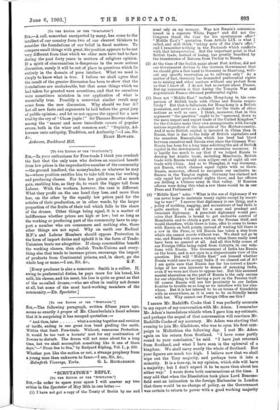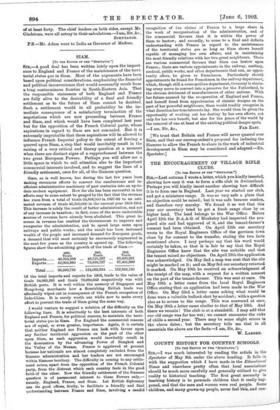" SCRUTATOR'S " REPLY.
[To THE EDITOR OP THE "SPECTATOR."] Snr,—In order to spare your space I will answer my two critics in the Spectator of May 30th in one letter :— (1) I have not got a copy of the Treaty of Berlin by me and must rely on my memory. Was not Russia's concession issued in a separate White Paper? and did not the Congress thank the Czar for his spout...anemia offer ? " Middle East's" quotation from Article LIX. is what I called, and still think, "taking note of the Czar's offer," and I remember nothing in the Protocols which conflicts with that interpretation. But the important point is that" British trade, instead of losing, has greatly benefited by the transference of Batoum from Turkey to Russia.
At the time of the foolish panic about Port Arthur, did not our Government declare to the German Government that we should give a free hand to Germany in Shantung, with- out any specific reservation as to railways only ? As a matter of fact, Germany has demanded preferential rights as to mining and other matters without any protest from us that I know of. I do not feel so certain about France. But my impression is that during the Tonquin War and negotiations France obtained preferential rights.
Does not "Middle East" include Hong-kong in his com- parison of British trade with China and Russia respec- tively? But that is fallacious, for Hong-kong is a British possession, and serves as a channel for the trade of other nations as well as ours. I think, moreover, that in this argument " the question" ought to be " narrowed down to the mere import and export trade of the United Kingdom," for the Colonies make their own arrangements with foreign nations regardless of the interests of the Mother-country. And if more British capital is invested in China than in Russia, that is due to the folly of British capitalists and the senseless Russophobia which has bred bad blood between ourselves and Russia ever since the Crimean War. Russia has been for a long time soliciting the aid of British capital in the development of her enormous resources. It is hardly too much to say that if we helped Russia to develop her Asiatic trade, including Manchuria, British trade with Russia would soon eclipse out of sight all our trade with China. And as to Shanghai, it was Germany, not Russia, which claimed equal rights with us there. Russia, moreover, offered to recognise our exclusive in- fluence in the Yangtse region. Germany has claimed not only equal but preferential rights there, and her officers are drilling a Chinese army in that valley. If Russian officers were doing this what a row there would be in our Press and Parliament!
(4) "Middle East" asks: " What is the use of diplomacy if we can never hope to maintain treaty rights except by resort- ing to war?" I answer that diplomacy is one thing, and a policy of scolding, nagging, and accusations of bad faith is quite another. I am all for a sane and prudent and prescient diplomacy. A prescient diplomacy would per- ceive that Russia is bound to get exclusive control of Manchuria and to obtain a port on the Persian Gulf, and would therefore, while there is time, offer to come to terms with Russia on both points, instead of waiting till there is a row in the Press, or till Russia has taken a step from which she cannot recede without war. We shall not go to war, and Russia will score a victory when there really need• have been no quarrel at all. And all this folly comes of. our Foreign Office being ruled from Calcutta in our rela- tions with Russia. The Government of India has Russia on the brain, and is not open to a dispassionate view of the question. But will " Middle East" ask himself whether Russia would care to occupy India if we cleared out of it?
I am quite sure that Russia has far too correct a know- ledge of her own interests to dream of annexing India, even if we were not there to oppose her. But this assumed mental aberration on the part of Russia is the only excuse for our objecting to her having a port on the Persian Gulf. Of course Russia will use her proximity to our Indian frontier to trouble us so long as we interfere with her else- where. But it is her interest to be on terms of friendship .with us everywhere, as it is ours to be on friendly terms with her. Why cannot our Foreign Office see this ?
I assure Mr. Radcliffe Cooke that I was perfectly accurate in my report of my conversation with Mr. Adam. I remember Mr. Adam's incredulous whistle when I gave him my estimate, and perhaps the sequel of that conversation will convince Mi. Radcliffe Cooke of my accuracy. Mr. Adam was starting that evening to join Mr. Gladstone, who was to open his first cam- paign in Midlothian the following day. I met Mr. Adam again on his return from Scotland. " I have come partly round to your conclusion," he said. "I have just returned from Scotland, and what I have seen is the upheaval of a kingdom. We shall carry nearly the whole of Scotland. But your figures are much too high. I believe now that we shall wipe out the Tory majority, and perhaps turn it into a minority. It is a toss-up, in my opinion, which side will have a majority ; but I don't expect it to be more than about ten either way." I wrote down both conversations at the time. - I may add that when the Dissolution took place Lord Beaconst- field sent an intimation to the foreign Embassies in London that there would be no change of .policy, as the Government- was certain to return to power with a good working majority
of at least forty. The chief leaders on both sides, except Mr. Gladstone, were all astray in their calculations.—I am, Sir, &c.,
SCRIITATOR.
P.8.—Mr. Adam went to India as Governor of Madras.











































 Previous page
Previous page